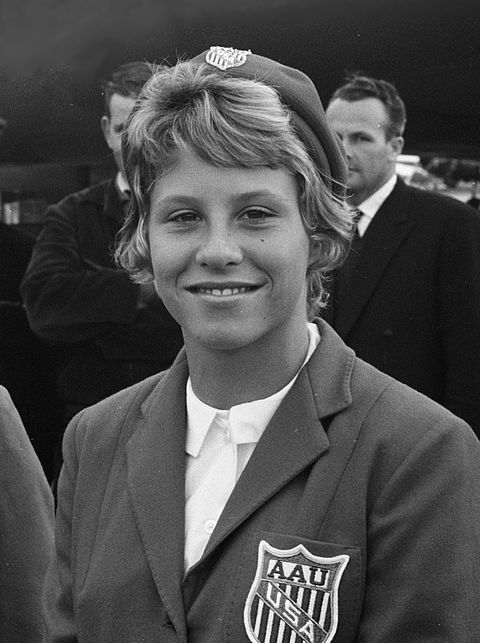The United States Olympic Committee (USOC) announced this week that Donna de Varona is the 2019 recipient of their Olympic Torch Award. Selection criteria for this award, as stated by the committee, requires that the honoree “made a positive impact on the Olympic Movement in the United States and has made many contributions to promoting the Olympic Ideals throughout the country.”
Since its inception in 1965, the award has been given out 27 times and became an annual honour in 2010. The very first Olympic Torch Award recipient was Avery Brundage who competed in the 1912 Olympics in Stockholm in the pentathlon and decathlon. Brundage was a long standing and influential member of the American Olympic Association, which would later become the USOC. He went on to serve as the President of the International Olympic Committee from 1952 to 1972. He was particularly revered for his pivotal role in the debate over American involvement in the 1936 Berlin Olympics, holding staunch pro-participation opinions. Following Brundage’s recognition in 1965, 26 Olympic athletes and administrators have been honored with the Torch Award.
In 1966, Olympic Torch Awards were given to both U.S President Gerald Ford and Philip O. Krumm, Olympic style skater. Ford is undoubtedly the highest profile recipient award and was honoured for his contributions to the U.S Olympic movement during his time as President. During his tenure, he supported the Movement by creating the President’s Commission on Olympic Sports and securing funding for the 1980 Games in Lake Placid, ew York.
2019 Olympic Torch Award winner Donna de Varona boasts an impressive resume, highlighted by her Olympic performances for the U.S in 1960 and 1964 Games. When she attended the 1960 games in Rome, she was only 13 years old and had already broken the 400 IM world record. On July 15 1960 she went a 5:36.5, breaking Sylvia Ruuska’s previous record by four seconds. The 1960 Games, however, did not include her signature event so she only swam the 4×100 free relay in prelims. Although the Americans went on to win gold in the finals, she was not awarded a medal for her prelim swim. Many write ups and bios on de Varona credit her with this gold medal, retroactively applying the new rule that any prelim or final swimmers involved in a gold medal performance are awarded the medal.
Her career spanned another 5 years and in that time she broke 18 world records and won her first 2 official Olympic gold medals in 1964. After enrolling at UCLA to study political science, her swim career was cut short due to the school’s lack of a women’s athletic program at the time. After retiring from the sport in 1965, de Varona stayed deeply involved in the Olympic Movement in the U.S. Her high level involvement included serving 5 times on the President’s Council on Physical Fitness and Sports. Additionally, she was instrumental in passing the 1978 Amateur Sports Act, which improved the governance of Olympic Sports in the U.S.
De Varona went on to work with American tennis legend Billie Jean King to establish the Women’s Sports Foundation. In 1974, the foundation was created to “create leaders by ensuring all girls access to sports.” Donna de Varona served as the first President, helping to begin a foundation that would go on to empower women in sports for decades to come.
The Olympic Torch Award recognizes de Varona’s commitment to the Olympic Movement that has spanned over 50 years. Having served on both the Executive Board of the Special Olympics International and the International Olympic Committee’s Women and Sports Commission for several years each, her involvement in the U.S Olympic Movement is matched only by few. Her innumerable contributions throughout her remarkable career have been widely recognized. The Olympic Torch Award is the latest on a long list of de Varona’s honours.
Non-exhaustive list of Donna de Varona‘s awards and accolades
- U.S Olympic Hall of Fame inductee (1987)
- International Swimming Hall of Fame Gold Medallion inductee (1991)
- Emmy Award (1991)
- Olympia Award (1992)
- Sports Illustrated for Women’s “100 Greatest Athletes” (1999)
- Olympic Order award (2000)
- National Women’s Hall of Fame inductee (2003)
- NCAA Theodore Roosevelt Award (2003)
De Varona is the third Olympic swimmer to win the award, after Richard Max Ritter (1908 & 1912 Games) won the award in 1966 and Anne Warner Gibbs (1960 Games) in 2015.


The article could have just mentioned that Brundage won the first one (or left it out) as he was not in the same league and DeVarona as a sportsperson or in fact, a person.
Congratulations Donna. Her contributions to amateur sports, women’s sports and equal rights for women’s athletes have made positive changes in the world of sport. Thank you.
Kudos to Donna De Varona. It’s disappointing, however, that the author whitewashes Avery Brundage’s checkered history and noted racism and anti-semitism. If you are going to talk about him, it’s irresponsible and incomplete to leave that information out.
Much deserved congratulations for Donna.
With all due respect to the “positivity” regarding Avery Brundage we see here Mr. Dornan are you aware that Mr. Brundage had a very dark side?
“He was particularly revered for his pivotal role in the debate over American involvement in the 1936 Berlin Olympics, holding staunch pro-participation opinions.”
Wow.
-To start with Ben you might want to research Mr. Brundage’s role regarding Jim Thorpe in the 1912 Olympics.
-To your point you might want to do a little more research in exactly why Mr. Brundage pushed so hard for the US to participate in the 1936 games.
-Then you might want to ask yourself how Marty Glickman and Sam Stoller felt… Read more »